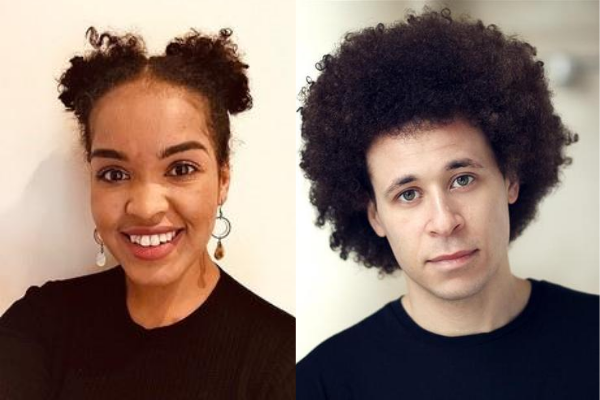
Helen Joy interviews Jodi Ann Nicholson and Connor Allen for Get the Chance, a voluntary organisation run by Guy O’Donnell and a very enthusiastic group of volunteers reviewing the Arts.
Helen
Hi Jodi and Connor great to meet you both.
Jodi
Hi I am Jodi Ann Nicholson, the dancer on Plethu/Weave project together with Connor
Connor
Hi I am Connor, an artist, poet and speaker of the word of ‘Branches of Me’.
Helen
How did you start working on this project?
Jodi
We were paired together through National Dance Company Wales and Literature Wales and we are both part of the Plethu/Weave project
Connor
We were paired and it skyrocketed from there.
Helen
Why do you say skyrocketed Connor?
Connor
I found that the conversations and the experiences we had just met and shot straight up. We carried on going and going until we hit the stars and once we were there in that beauty of space and we were able to create ‘the branches of me’. It was a nice exploration. I felt we truly met and it skyrocketed in the conversations we had, the warmth that we shared and the talent we brought to the table.
Helen
What was it about each of you that connected? Because quite often we are put together in projects and it doesn’t always necessarily work, you don’t find that mutual passion. What was it that you found in each other that enabled you to work together so well?
Jodi
So both of our practices separately share similar interests when it comes to exploring identity and in particular mixed race identity. So when we came together, Connor was an easy person to talk to and easy to listen to so we just bounced off each other had a great open, honest space to communicate with each other and we shared a lot of interest in our work.
Connor
I think for me it was meeting someone who was open and gentle as Jodi. We were able to have those conversations where we could connect and just talk and talk for hours, understanding each other. On a base human level it’s beautiful and on these types of project it just helps.
Helen
What was the message you were trying to get across? What is the project about?
Connor
Personally it is about that exploration of a mixed race identity in a society that sees race as black and white. There is a unique point in a mixed race identity where you visualise a family tree and it has black branches and white branches. It is both of those cultures and ethnicities that make us what we are. Growing up, my exploration of identity was unique because I was too white for my black friends but too black for my white friends. So I was thinking, well where do I fit in? I don’t feel like I fit in either part of this thread. That is what is great about working on this project and chatting with Jodi. We can then bounce off each other and say that yeah, I felt that and I can relate to that. So that we then started to formulate an idea. It was not just me. Growing up I felt a lot of times that it was just me. Why am I feeling like this, when no one else is?
Jodi
I would say a lot of the same as Connor has. Looking about what it is to be mixed race in a world where it is going to be white to be black and finding the balance and harmony and finding our voice within it. Because we are two people who have been looking at this separately for a while, to come together and realise that we do share a lot of these experiences. You start to realise that perhaps this isn’t just our individual dilemmas of identity. Maybe other people of mixed race and backgrounds share the same thing as well. I think it was important to get our voices out and work out what our voice is and hopefully share what other peoples voice is.
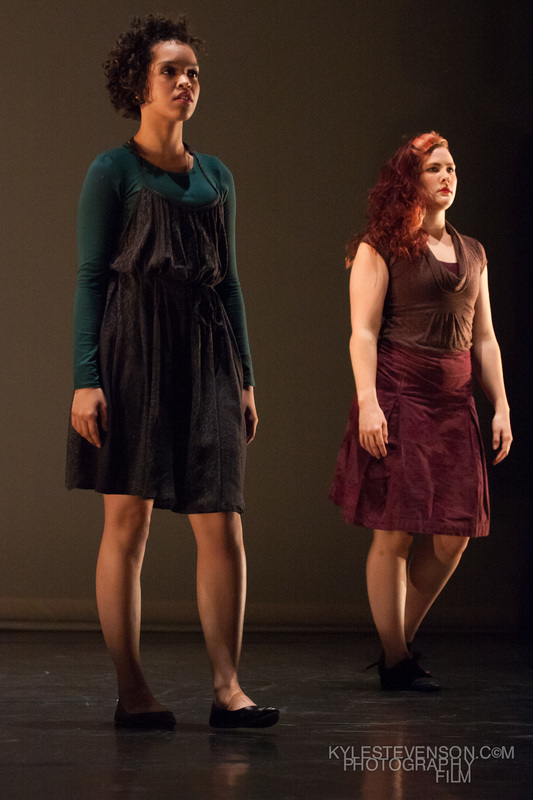
Connor
So then we can get universal. We have our individual experiences we bounce off and we can use that to get to the heart of why we feel like this. Once we get to the heart of the issue. I hate the word issue, it’s not an issue.
Jodi
Experience maybe
Connor
That’s why she is brilliant see! By having the universality of our experience and that of ethnicity others can relate to it.

Helen
This issue around visual identity and how we are seen and how we want to be seen is a massive one. It’s a human condition isn’t it? You are trying to find a way of illustrating and narrating how it feels to be in that grey area in between black and white and how that feels and how you share that and share it in a universal way. And you have done it playing to your individual strengths. So Jodi, you’re a dancer, Connor you are an actor, writer, poet. And you’ve pulled together those different ways of communication to produce a two minute track. How did it feel to make that film? Do you feel confident you have got those messages across? And what are those messages that you really want us to get?
Connor
I personally feel confident, not so much a message but that it has definitely opened up a conversation around these issues where people can relate to that or say ‘that line, that really stuck with me’. So a lot of films being created were about 90 seconds and we went back and forth so many times because we just couldn’t hit that limit. And actually we don’t want to sacrifice our art and our vision to try and move it down to there. We truly believe in the potential in this and to get the true message across it needs to be the length it needs to be and we got it to 2 minutes. We were not going to sacrifice any more. It was an important point for us to say that this is the story we want to tell.
Helen
I tell you what, I’ve grown to really like a lot of the modern poets in a way that I did not think I would.
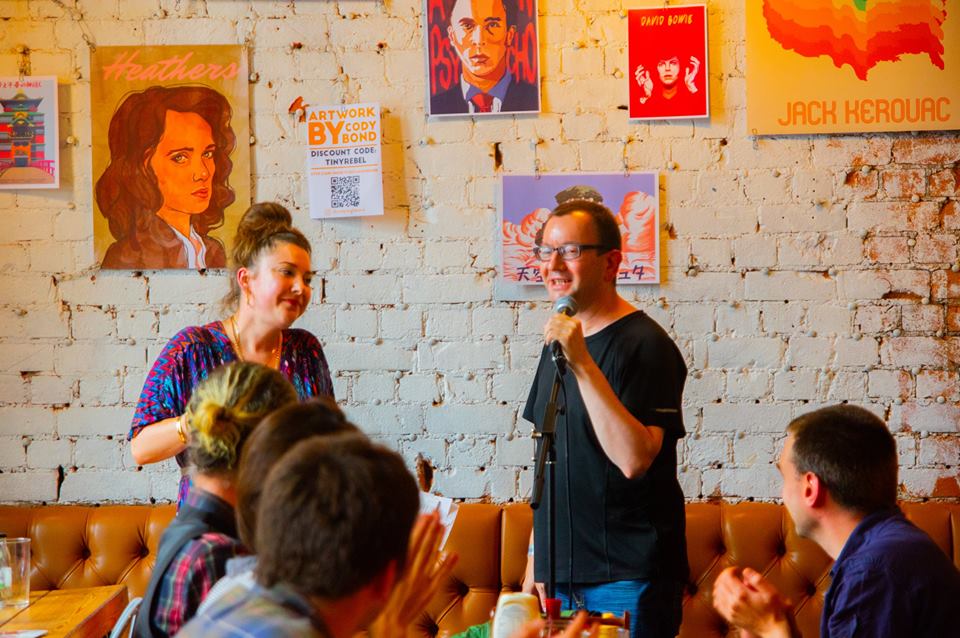
I was working with a guy called William Dean Ford last week on a mental health project with some poetry and he quite often uses the Haiku format, but kind of repeatedly so it is a kind of Haiku in verses if that makes sense and I’ve been really struck at poetry as a means of getting through to people. I’ve been really struck by that recently and I think that because now we’re trained like Pavlov’s dogs into snippets of information, you know social media drives snippets of information all the time, everything is short and fast and I’ve been interested in watching the poets respond to that and being so careful and so sensitive about their use of words to make best use of that space. It’s been absolutely brilliant. Now I think they have a role that wasn’t there for a long time.
Connor
Yeah that means like there is power in words. Words carry so much power and weight that sometimes people forget that. In the same way that music can have a profound effect on you as you can relate to that and you hear those lyrics and they resonate with you in a way that other things don’t. Words are some of the most powerful tools we have
Helen
Yes they are and I’ve been fascinated in recent years with dance for exactly the same reason. Jodi you used that word ‘Economy’ and inspiring people to think about things in different ways and its part of what you are trying to do. Okay, if you can’t get it that way, try it this way it’s using all the things at our fingertips to say you need to think about this. You know you can’t ignore this, it’s really important
Jodi
When it comes to dance you have to communicate. Half or a good measure of our communication comes from our bodies as well as language and words so I think dance works well as it communicates in a different way and level than language or words.

Helen
Tell us about this video, ‘Identity – Black Lives Matter’ and your role in communicating what it feels like to you as a mixed race individuals.
Connor
For me personally, I did an interesting thing. I just watched it, turned the audio off so just watched Jodi’s dance and it is a different experience. For me this is linked, we know why we made it and our exploration. But for me it’s about what it means for whoever needs it. Its subjective, some people are going to watch that and it will deeply resonate with them, at a level that other pieces might not and other people are going to be educated, and say, ‘wow, I’ve never even thought about that, it’s really interesting.’ And there might be people out there watching and thinking ‘that’s a load of crap.’ And just skip past it. And that’s fine. It’s what it is to them. We will always have our back and forth, our moment of exploring and what it means for us as two mixed race artists. We are quite open and honest about that. It is about that exploration of identity and what that means – Where do we fit it in to this movement of Black Lives Matter in this pivotal moment in society and in history. Right now we are in a unique tipping point that Black Lives Matter and black lives are being shone in a different light. People are hearing our stories and listening to our voices. On the one hand there are a lot of people who are scared by that but at the same time there are a lot of people embracing and supporting that. It’s a unique balance for me. What I would like is for people to watch the film and to spark up conversations about what an intertwined identity means on both levels.
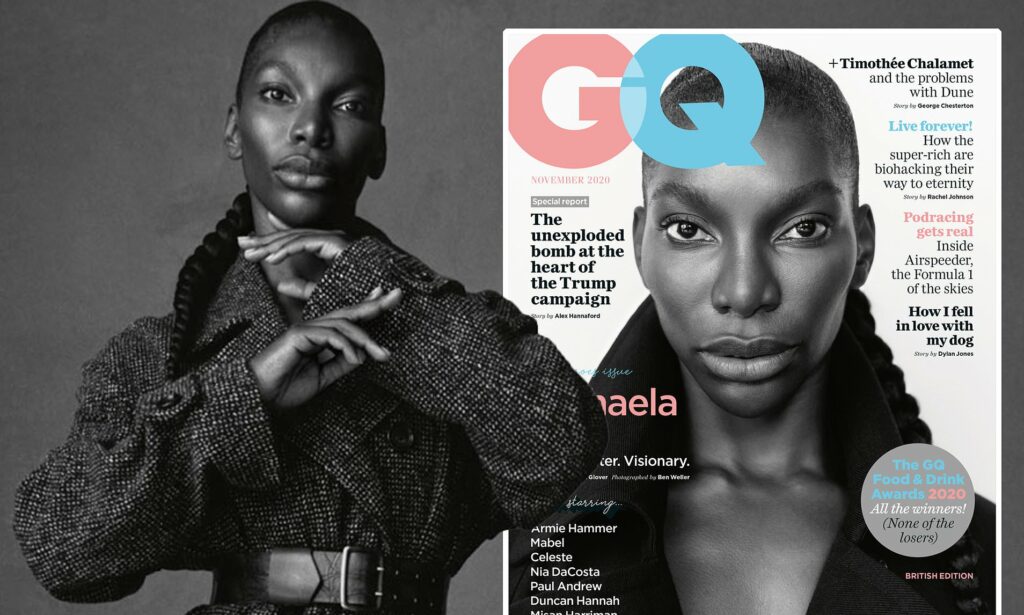
I read a really interesting quote by Donald Glover and Michaela Corel in GQ magazine. Donald talks there of how a lot of white people are scared to have those conversations as they might see themselves reflected back on themselves and that is a scary thing, to know that you might have said the wrong thing to someone or that you might carry those prejudices and you might not like them. I think because we live in a society of counter culture and outrage, people are quick to say ‘No you’re wrong and I’m right’. It is just about opening up that conversation because I truly believe that if you walk in the shoes of another person you have a greater capacity for empathy and that all it is about. Knowing that we have our experiences but there are going to be other experiences. As I was saying to Jodi, I can never relate to what it means to be a woman because I am not a women. I don’t have menstrual cycles I don’t carry children, and there are all these other things I can’t relate to I can’t resonate but what I can do because I’ve been raised by a Queen is knowing in some way what it means to go through those issues, those adversities is be an ally and support women and females. That is all we are asking. Even if you don’t fully agree with us, even if it doesn’t resonate, you can still be an ally, you can still listen and have that greater capacity for empathy. A lot of people nowadays say they don’t see colour, but you have to see colour to see our experience and then empathise with what we are going through. You might not be able to relate to but you can empathise what we are going through. Long story short, I just want the film to open up the door to empathy for other mixed race or black people who are feeling the way we are feeling.
Helen
I was just going to say to Jodi that you are communicating in a very different way from Connor, who is using the spoken word to get his narrative across and he is doing it in a very universal, embracing way. You are using the medium of dance and film. How do you feel when you put your work out there and people can interpret it in all sorts of different ways and not just the way you necessarily want.
Jodi
I am completely fine with that ultimately. I know that there is a space for interpretation when you put anything out there no matter what form it takes whether it’s through poetry, right through art or whether it’s through dance. When I put work out there, there has been a long process before it that I have worked out whether it’s by myself or with somebody I have been collaborating with, working out what it is I want to say, what it is I think and how I think it is best to communicate and to show this through my body, through film, through whatever medium I’m using. I am very open and I put it out there for there to be conversation about how people experience what I am talking about or what I am trying to get across. Sometimes its picked up and people think that is exactly how I feel, It’s exactly what I think and this is my experience and it’s a completely shared thing. Other people go ‘Oh, I don’t quite understand what you are talking about or what you are trying to show.’ And I go ‘well okay, why? Or what is it that you did get?’ And I think that is just as interesting and just as important to me as an artist. Because either something new will come out of it that I will then learn from or I’ll go, ‘Okay, I need to work on that as an artist.’ Depending on how important it is to me that a particular message is got across. I put work out there for the conversation about in this case, Identity. And how we experience each other and have space to have openness to experiencing other people and their lives.
Connor
Going off the back of that, I learned recently, a year back, there was this Russian practitioner called Kushelov and he came up with this thing called ‘The Kushelov Effect.’ He made three short films, and he got a Russian actress and he wanted to try and grab the visuals of what it meant and show what hunger, grief and laughter felt like. He wanted to film the three emotions in their entirety. He filmed this actress looking into an empty bowl, a coffin and something else and filmed the shot. He released this film of these three stages band it just went crazy, and people went ‘OMG, the actress has really got the true meaning of grief in her eyes and the innocence in her laughter, you can just tell it’
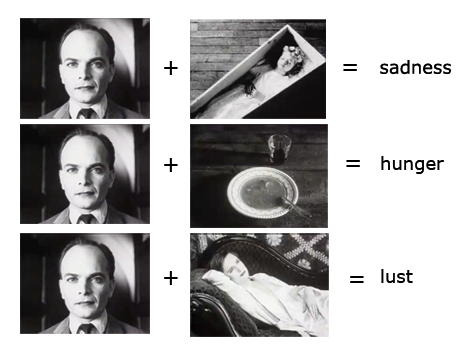
It came out years later that he used the exact same shot on all three films. So what that meant was, its just audience subjectivity. It is subjective to the audience. They put the take on that. Going off what you said then it is quite similar. We know why we made this, and why we make our work but as soon as it goes out there, it is up to the audiences’ perceptions to be ‘Ah, you meant that, didn’t you.’ Or, ‘I didn’t quite get that,’ it’s not really resonated. It’s just subjectivity, and what it means to the audience.
Helen
And I think there is something there about taking the fear out of the conversations. We are all struggling with using the right words, the right time, the right people and the right place. It takes away the honesty and the openness sometimes. So it is really important to have those conversations. That’s how people change, how they are educated. In my view it needs to be done in the most non-confrontational way as possible so that you are embracing all those different views.
Connor
You need those. You need different views but you need also that openness to say ‘okay cool so that what you have just said is not how we’re perceived but I can educate you on the right terminology or the right way to think about it.‘ So education for me is key. I could be screaming down a void, the black hole that is Twitter and saying ‘this is how I should be feeling now’ And that’s fine. J Cole is a rapper, he released a song recently where he spoke quite openly about that won’t culture and how he is not that. I think everyone has their ways of trying to tackle musicians who deal with that. Some people are very vocal and will do all their research and they will go out there and ban drugs. Other people like me, I’m very reserved and I would rather speak to individuals and plant these little seeds and hopefully then they will grow into fruition years later. I work in these communities in that way.
For me personally it is about education and we just need to be more open and willing to be like ‘You can’t say that because that offends me, or I don’t like that’. For example using the N word. Some members of the community will use the N word other people won’t.
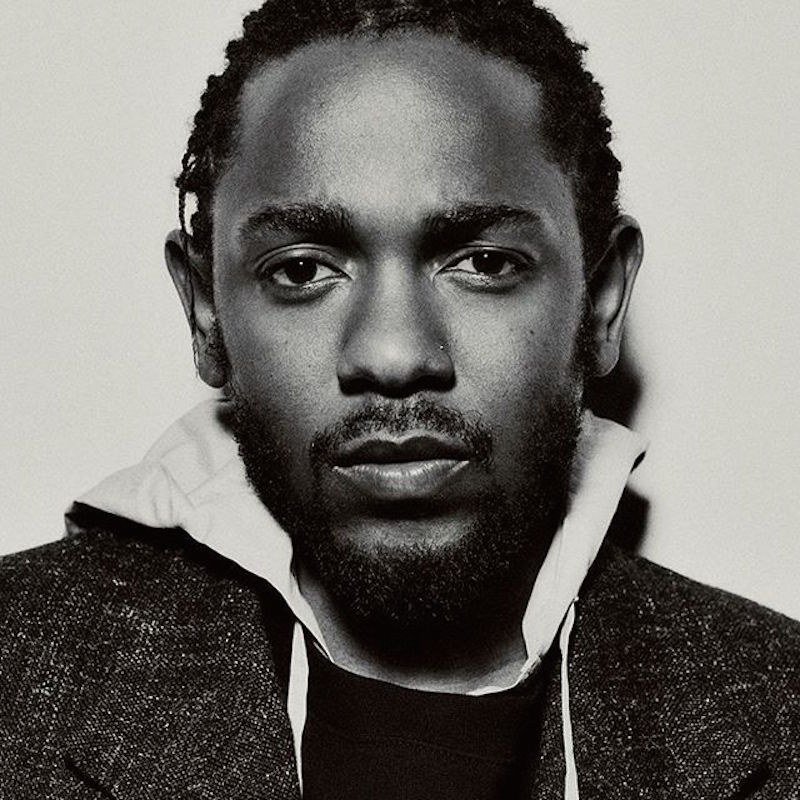
Kendrick Lamarr had an issue where he was in Australia on a world tour and he brought a white female fan up on stage and she started rapping along to one of his songs and then obviously the N word was in the song and so she said the N word and he stopped the show. And he said ‘whoa, no, you don’t get to say that.’ But in that instance for example, it’s in your music and she was a fan and she’s just singing along. So instead of automatically saying ‘You don’t get to say that cos you are white.’ Let’s have this conversation. Why can’t she say that because she is rapping along to a song and she is a fan? They are awkward conversations and you are trying to justify as to why a section of society gets to say well ‘you get to say that, why can’t I say that word?‘ Firstly there are two iterations of that word, one with an ‘a’ and one with an ‘er’ so it depends on what connotation you are using. By having more openness, gentleness and willingness to engage in conversation. It doesn’t have to be confrontational. You can have a nice debate and you are not always going to see eye to eye and that’s fine. You don’t have to agree with everything we are saying if you can say that you can see where you are coming from, I just don’t agree. That’s also fine, it’s the small victories.
Jodi
I’m with Connor, I think education is massive, important. There just needs to be space for people to speak their mind and learn from each other. I know from myself in general in life I can be really scared about talking sometimes because I am trying to make sure that once the words have left my mouth I am not going to regret it or change my mind afterwards. I think that if you don’t understand something or you don’t know then people need to give you the space to ask. Maybe you are going to get it wrong or you may offend somebody or you are not going to offend anyone, but there be space for it to be said because once we start talking about it we can start understanding it and each other and where we are coming from. We shouldn’t be scared about getting it wrong. You can get it wrong once, maybe not twice or three times. Which is why I think my work and this piece is about wanting to open up the conversation, this is what we have been talking about for the last month and what we have been thinking about ourselves for years. This is our point of showing you guys, now what do you think. Let’s have space to do that. Because when it comes to race it is important to have the conversations and feel confident to do so.
Helen
And it is up to all of us to create the environment to have that conversation. To make that safe space so that however those conversations are being had in whatever medium they are embraced and valued. I can’t tell you how much I’ve enjoyed listening to you. You are the most remarkable people and I don’t doubt you are going to have remarkable futures. I would recommend to anybody that they follow Jodi and Connor and in particular pick up on this latest video piece because it is absolutely beautiful. Can you tell us where we can find that video what it is called and how we could contact you if we wanted to have that conversation?
Connor
The pieces are called ‘The Branches of Me.’ It can be found on Literature Wales and National Dance Company Wales Twitter. It’s also NDCWales website and on You Tube.
Jodi
It’s on Instagram. All social media platforms used by literature Wales and National Dance Company Wales.
Connor
If you want to contact me, I am on Twitter, @connor_allen92 or my website, connorallen.co.uk there is a contact form on there.
Jodi
To contact me, probably my Instagram is best, jodiannnicholson_dance_artist or I have a website with a contact page, that is jodiannnicholson@weebly. com
Helen
Thank you so much both of you, this is so important. Anybody who is feeling that they are not part of something…. It’s dreadful really. We all need to feel part of something. We are herd animals and to feel excluded from a conversation in any sense is not a nice feeling, thanks for your time.
Interview transcribed by Richard Evans, Get the Chance.

